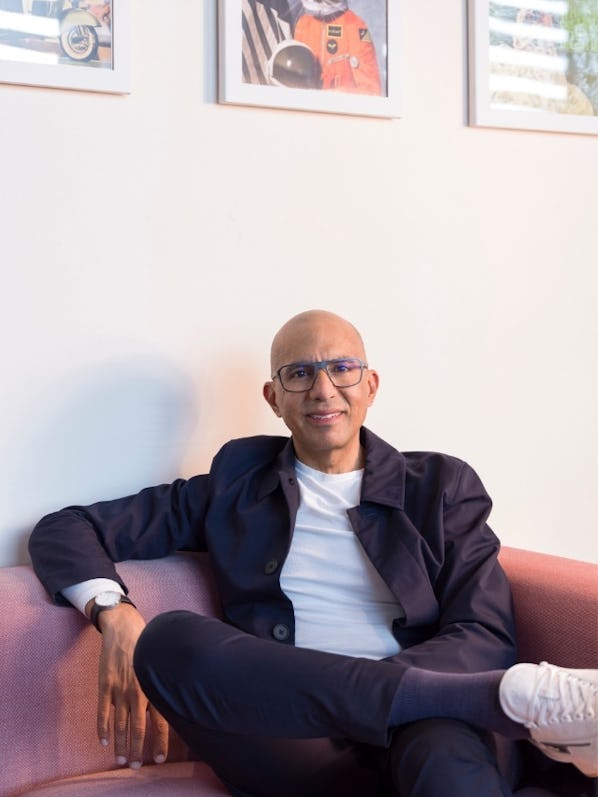JUST ENTREPRENEURINTERVIEWS CO-FOUNDER AMAR RADIA
Meet the founder of MTHK
I’m Amar Radia, I come from a family of entrepreneurs and am a co-founder of the new eye health brand MTHK. I also co-founded restaurant group Dishoom and tech accessories brand Nolii. I’m a Cambridge mathematician and a former Chartered Accountant from the City. I’m a Trustee of Kidney Care UK - the UK’s largest kidney charity and I mentor young kidney patients. I’m married with two young daughters and live in Clerkenwell, London, UK.

The Interview
My eye health journey began 40 years ago (the day I first wore glasses), and I’ve experienced everything from laser eye surgery and astigmatism to dry eyes, styes and high prescription glasses. My light bulb moment came at the start of the pandemic in 2020 when my pre-teen daughter started complaining about burning eyes and headaches after her first day of homeschooling on Zoom. It became clear that we were all suffering - and these problems were only going to get worse. I realised how much we demand of our eyes but how little we take care of them. It made no sense. And the products that were available didn’t do enough to help, so I set out to change that together with my co-founding team, consisting of some of the world’s best eye specialists from Moorfields Eye Hospital in London.
“Every day is a school day”, which means that you should always be listening and learning. Don’t fall in love with your ideas. Be prepared to change and pivot. Be humble and listen widely - from experts and customers to team members on the ‘front line’. Plan well, and remember, most things will always take longer and cost more than you think.
My own 40-year history of eye health issues and thinking about the world both my daughters will grow up into - a future where they’ll be completely reliant on sight and sound to connect with the world. Senses that we don’t pay enough attention to. And my end goal is to create a company that reflects the relationship that I have with my co-founders - a company that has a great team, that pulls together and carries this forward with some of our shared values: (i) pushing boundaries, (ii) remaining an expert-led brand that’s clear, simple and easy to understand (iii) having kindness (or Seva) at our core with how we work together and with our customers.
The “go fast and break things” or first-to-market approach doesn’t work for most of us. It’s a good soundbite to use if you’ve had some great luck (and easy access to funding). In the past when I’ve gone fast and rushed (launches, products, brands, hiring, signing leases etc), I’ve ended up paying a very big price. Unwinding these fast decisions is costly and painful - from writing off or disposing of stock to closing businesses and letting staff go. Being precise, careful and smart is how I’ve approached MTHK. From products and production to the brand, and most importantly, the people I work with. It’s been a very personal journey for me.
I’m up by 5 am. I enjoy the early morning quiet with a quick cup of coffee and a scan of the papers. I’m a morning person, so I tackle the hard tasks first - and try to get a good chunk done before anyone wakes up. I’ll split my day with a late-morning gym session, which gives me a break and an oxygen boost.
It’s tough and doesn’t seem to get easier with time. Learn to steady yourself and set your north star. Break up the big tasks into smaller, bitesize steps. Take breaks often and sleep on or take time on bigger questions and decisions - they often become clearer a day or two later.
My biggest lessons have come from my past failures. It’s important to take some time to honestly reflect on what happened and ‘own’ your mistakes. I put these down in a set of private notes, which I refer back to regularly. It keeps me grounded and humble. Your past mistakes and losses are wasted if you don’t learn from them. Failure is the worst thing when you’re in it but failure builds resilience.
“The 'go fast and break things' or first-to-market approach doesn’t work for most of us. It’s a good soundbite to use if you’ve had some great luck and access to cheap capital”
If you could be in a room with 4 entrepreneurs, who would they be and why?
She was decades ahead of her time with a purpose-led organisation, and created the original B Corp.
A venture capitalist and my Harvard Business School professor. He taught me critical thinking and about focusing on unit economics.
Not for the money, rockets or cars (which are lovely). He unashamedly embraces his inner quirkiness.
A born entrepreneur who started from very humble beginnings. He taught me about inner discipline, hard work and humility.
“Moments of doubt don't get easier with time. Learn to steady yourself and set your north star. Break up the big tasks into smaller, bitesize steps. Take breaks often and sleep on or take time on bigger questions and decisions - they often become clearer a day or two later.”
Working with co-founders can be tricky, so understanding and compromise is important.
Building a business together can be challenging, but immensely rewarding with the right partners. It won’t work unless we have shared values and an overarching purpose for the business, which we have at MTHK.
As a team, I ensure we have clear structured and unstructured time together. We also leave our egos at the door. And we put in place a good shareholders agreement that covers worst-case scenarios fairly (relationship breaking down), because when working as a team, you should be able to discuss what happens in both the best and worst of circumstances.

“What really matters to the next generation? The next generation are actively shaping their futures from a very young age - forming opinions, speaking out, seeking change, and as a result, they’re shaping our futures too.”
WHAT'S THE MOST IMPORTANT QUESTION THAT ENTREPRENEURS SHOULD BE ASKING THEMSELVES?
What would be your top three tips to fellow entrepreneurs to look after their mental health?
Have outside interests that are completely unrelated to your business. I'm currently watching (and trying hard to understand) the Fermilab YouTube videos on particle physics, for example.
Schedule time off when you take a break from phones, messages and emails. Ideally, schedule 1-2 weeks twice a year. In practice, this is hard because entrepreneurs by their very nature are ‘always on’ and/or some business decisions have to come from you. So put in place some rules. Firstly, set fixed times of the day when you scan through all your messages - try and fix it to 1 hour (mornings are best, so the rest of the day is free). The added benefit of time off is two-fold. In addition to getting some rest, your mind has space to subconsciously think.
Learn that working smart is better than just working hard. This comes down to the 80/20 rule. Just 20% of your work and activity will deliver 80% of the profits or long-term value. You’ll get better at identifying the 20% with experience and structured self-reflection. You can help this by in-sourcing the experience with good advisors or coaches.

